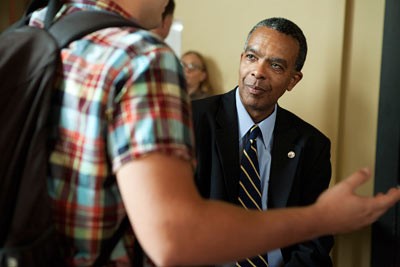Peace Corps experience is 'transformative,' says director
By Krishna Ramanujan
Given that Cornell ranked third in the number of Peace Corps volunteers recruited in 2009, has 46 alumni currently serving and some 1,500 over the last 50 years, it is no wonder that Aaron Williams, the international volunteer agency's director, paid a visit to campus Sept. 2.
"Cornell has had a long and distinguished record and partnership with Peace Corps, from the very beginning," Williams said in a conversation with Cornell Chronicle and Cornell Daily Sun reporters. "Cornell was a place where we trained many Peace Corps volunteers in the early years, it's a place where we recruited their faculty to serve as staff, and Cornell was a principal university that return Peace Corps volunteers came back to, to pursue graduate education," he added.
Williams was on campus to meet with university leaders "to broaden and deepen our partnership" and to give a lecture titled "Fifty Years of Promoting World Peace and Friendship." Cornell provides training assistance through the International Agriculture Program within the College of Agriculture and Life Sciences. His lecture was sponsored by the Cornell Institute for Public Affairs.
Williams outlined three main goals that have remained unchanged since the organization's founding:
- "to provide trained men and women to work in priority development projects at the grassroots level," now in 77 countries worldwide;
- "to give the peoples of those communities a chance to meet an American face-to-face and really to see the true face of America" often for the first time; and
- "for those volunteers to bring that rich experience home and really make a difference in our society here by enlightening and better informing the broad American community about the countries where they served."
He added that the "huge cadre" of Cornell faculty members who returned from the Peace Corps to teach were "a living testimonial to the importance" of the service.
Williams, who volunteered in the Dominican Republic from 1967 to 1970 training rural high school teachers and then served as a professor of teaching methods at the Universidad Catolica Madre y Maestra in Santiago, described his experience abroad as transformative.
"It changed my life forever, opened doors for me that I never knew existed. I never could have imagined ... that I was going to end up being the director of the Peace Corps," he said.
His first few months in the Dominican Republic, armed only with broken Spanish, were humbling due to the kindness of the local teachers he trained. "I thought I was there to help them, but they were there to help me," he said. "You talk to any Peace Corps volunteer, and they will tell you, whatever you contribute, you receive 15 times more back," he said.
Named director in 2009, Williams said his initial goals – as the Peace Corps celebrates its 50th year – are to expand the number of Americans who serve and the number of countries the service operates in. Colombia, Indonesia and Sierra Leone were added this year, with "plans to go back into Haiti," he said.
The Peace Corps receives 15,000 applications for around 4,000 slots. The agency trains people to teach, promotes health care in HIV/AIDS and malaria, provides services and advice for small businesses and microfinance and offers training in 250 languages, Williams said.
When it comes to the type of applicant the organization seeks, "the No. 1 requirement is the desire to serve," he said.
Media Contact
Get Cornell news delivered right to your inbox.
Subscribe